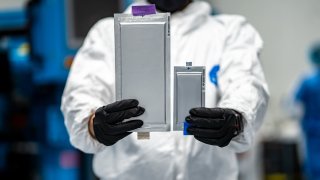
- Ford and BMW are leading a $130 million funding round in a solid-state battery start-up, Solid Power.
- The automakers hope to use the next-generation batteries in electric vehicles by the end of this decade.
- Solid-state batteries can be lighter, with greater energy density and provide more range at a lower cost than today's EVs with lithium-ion batteries.
DETROIT — Ford Motor is increasing its investment in EV battery start-up Solid Power with hopes of starting to integrate the next-generation batteries into its electric vehicles by the end of this decade.
Ford, which initially invested in the company in 2019, led a $130 million funding round in Solid Power with BMW and Venture capital firm Volta Energy Technologies, the companies announced Monday.
Solid Power makes so-called solid-state batteries, which don't use the liquid electrolyte found in the conventional lithium-ion batteries currently used to power most electric vehicles. The batteries can be lighter, with greater energy density that provides more range at a lower cost. But they are currently more costly than lithium-ion batteries and early in development.
Get New England news, weather forecasts and entertainment stories to your inbox. Sign up for NECN newsletters.
Under the new agreement, Ford and BMW will receive automotive-capable battery cells from Solid Power for testing and integration into its future vehicles starting next year. The Series B investment round will allow the company to expand in-house manufacturing capabilities and positions, Solid Power CEO Doug Campbell said in a release.
Hau Thai-Tang, Ford's chief product platform and operations officer, said the automaker believes the industry will start transitioning from lithium-ion batteries to solid state over the next decade. He declined to disclose Ford's total investment in solid-state batteries but said it's "significantly smaller" than lithium-ion at this time.
Money Report
"We think it's realistic that by the end of this decade, there's a good chance that this is something we can go into production with," he told CNBC during an interview.
BMW said it also expects to have solid-state batteries in production EVs by the end of the decade. A demonstrator vehicle featuring the technology is expected before 2025, according to a company spokesman.
The investment announcement comes less than a week after Ford said it would invest $185 million in a new battery lab as a step toward manufacturing its own battery cells for electric vehicles. That's in addition to plans to put $22 billion into vehicle electrification from 2016 through 2025.
Ford's new facility will not be a full battery cell production facility like Tesla has. General Motors recently announced $4.6 billion in investments in two U.S. battery cell production plants with LG Energy Solution.






